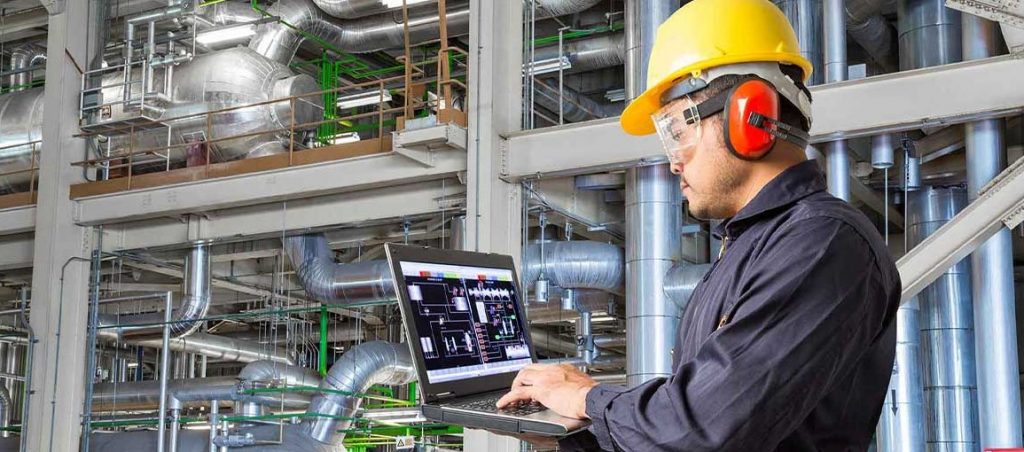Industry 4.0, also known as the Fourth Industrial Revolution, marks a significant transformation in industrial operations driven by advancements in technology. This era focuses on creating smart, efficient, and interconnected systems that revolutionise how industries function.
This guide introduces the core concepts of Industry 4.0, its advantages, and how businesses can prepare for this innovative wave.
What is Industry 4.0?
Industry 4.0 involves integrating advanced technologies like cyber-physical systems, the Internet of Things (IoT), big data, and artificial intelligence (AI) into industrial processes. These technologies collaborate to form a network of intelligent machines capable of making autonomous decisions, optimising operations, and boosting efficiency.
Key components of Industry 4.0
- Cyber-physical systems (CPS): These systems use computer-based algorithms to monitor and control physical processes. CPS can interact with humans in real time through sensors and actuators.
- Internet of Things (IoT): IoT connects devices and equipment to the internet, allowing them to collect and share data. This connectivity facilitates seamless communication between machines and systems.
- Big Data and Analytics: The extensive data generated by connected devices can be analysed to gain insights and make informed decisions. Big data analytics aids in predicting maintenance needs, optimising production schedules, and enhancing product quality.
- Artificial Intelligence (AI): AI algorithms process and analyse data to automate decision-making processes. AI enhances predictive maintenance, quality control, and supply chain management.
The Benefits of Industry 4.0
Adopting Industry 4.0 offers numerous advantages across various sectors:
- Increased Efficiency: Smart machines and automated systems perform tasks faster and with greater precision than human workers, leading to higher productivity and reduced operational costs.
- Improved Quality: Real-time monitoring and data analytics ensure consistent product quality. Deviations from standards are detected and corrected promptly.
- Enhanced Flexibility: Industry 4.0 allows for agile manufacturing processes. Production lines can be reconfigured quickly to accommodate new products or changes in demand.
- Predictive Maintenance: Sensors and IoT devices continuously monitor equipment health. Predictive analytics can foresee potential failures and schedule maintenance before breakdowns occur, minimising downtime.
- Better Supply Chain Management: Enhanced visibility and data sharing across the supply chain improve coordination and reduce delays. Companies can respond swiftly to market changes and customer demands.
Preparing for Industry 4.0
Transitioning to Industry 4.0 requires careful planning and strategic implementation. Here are steps businesses can take to prepare:
1. Assess Current Capabilities: Evaluate existing systems, processes, and technologies. Identify areas that can benefit from digital transformation and those that need upgrading.
2. Invest in Technology: Acquire the necessary hardware and software to support Industry 4.0 initiatives. This may include IoT devices, sensors, AI algorithms, and data analytics tools.
3. Develop a Skilled Workforce: Ensure employees are trained to work with new technologies. Upskilling and reskilling programs are crucial to prepare the workforce for digital transformation.
4. Start Small: Begin with pilot projects to test the implementation of Industry 4.0 technologies. Learn from these projects and gradually scale up efforts.
5. Foster a Culture of Innovation: Encourage a culture that embraces change and innovation. Support experimentation and continuous improvement to fully leverage Industry 4.0’s potential.
The Importance of Energy Management in Industry 4.0
Efficient energy management is vital for the success of Industry 4.0. Effective use of energy is essential for maintaining cost-effectiveness and sustainability in industrial operations. Incorporating energy management systems (EMS) helps monitor and optimize energy consumption in real time, ensuring energy efficiency.
Leveraging Smart Energy Solutions
To fully benefit from Industry 4.0, it’s crucial to deploy smart energy solutions. These solutions involve advanced electrical instruments and equipment designed to enhance energy efficiency and reduce waste. Implementing such solutions not only supports sustainability goals but also reduces operational costs and improves overall performance.
Reputable Energy Brands Pave The Way
Partnering with reputable energy brands is essential to maximizing the benefits of Industry 4.0. These brands offer high-quality electrical instruments, equipment, and devices that are integral to deploying smart industrial systems. By collaborating with trusted energy providers, businesses can access the latest technologies and expert guidance on implementing energy-efficient solutions. This partnership ensures that the transition to Industry 4.0 is smooth, cost-effective, and sustainable.
Embracing the Future with Industry 4.0
Industry 4.0 signifies a revolutionary shift in industrial operations powered by advanced technologies like IoT, AI, and cyber-physical systems. The benefits of increased efficiency, improved quality, and enhanced flexibility make a compelling case for businesses to embrace this new era of industrial development. By preparing strategically and incorporating smart energy solutions, companies can unlock the full potential of Industry 4.0, paving the way for a smarter, more efficient, and sustainable future.



